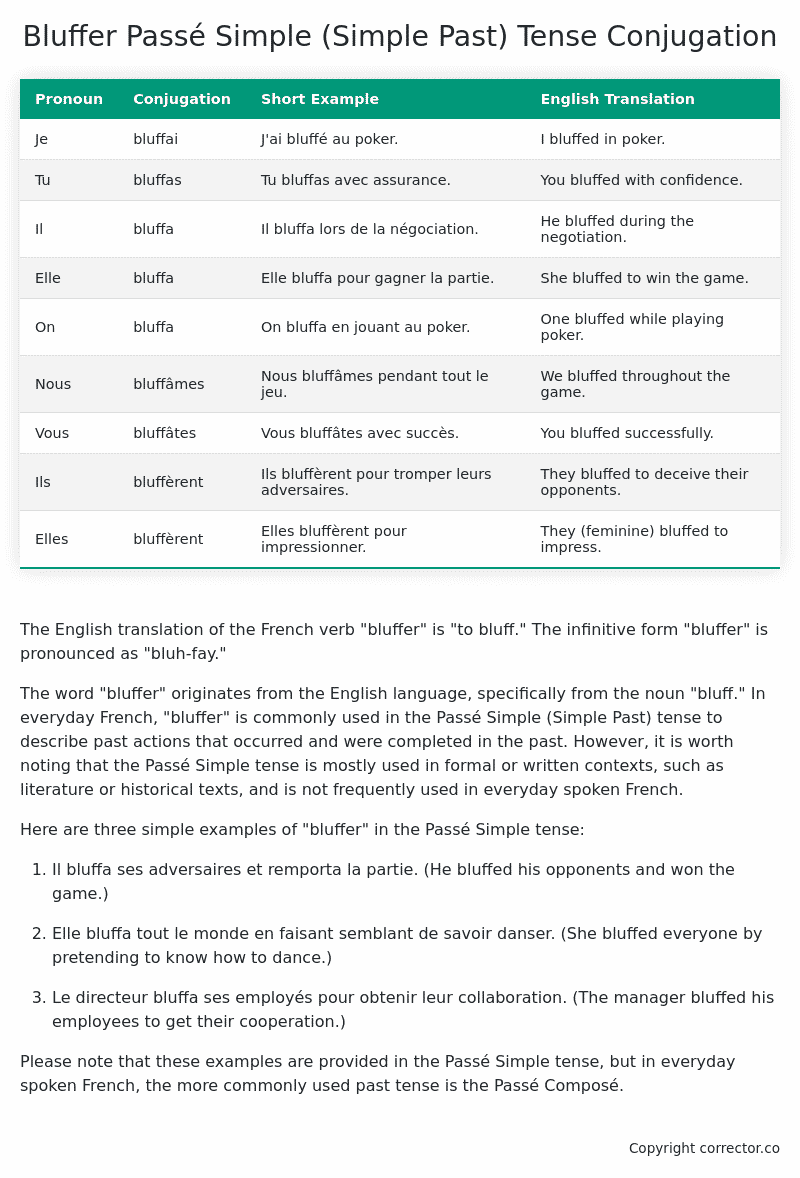Passé Simple (Simple Past) Tense Conjugation of the French Verb bluffer
Introduction to the verb bluffer
The English translation of the French verb “bluffer” is “to bluff.” The infinitive form “bluffer” is pronounced as “bluh-fay.”
The word “bluffer” originates from the English language, specifically from the noun “bluff.” In everyday French, “bluffer” is commonly used in the Passé Simple (Simple Past) tense to describe past actions that occurred and were completed in the past. However, it is worth noting that the Passé Simple tense is mostly used in formal or written contexts, such as literature or historical texts, and is not frequently used in everyday spoken French.
Here are three simple examples of “bluffer” in the Passé Simple tense:
-
Il bluffa ses adversaires et remporta la partie.
(He bluffed his opponents and won the game.) -
Elle bluffa tout le monde en faisant semblant de savoir danser.
(She bluffed everyone by pretending to know how to dance.) -
Le directeur bluffa ses employés pour obtenir leur collaboration.
(The manager bluffed his employees to get their cooperation.)
Please note that these examples are provided in the Passé Simple tense, but in everyday spoken French, the more commonly used past tense is the Passé Composé.
Table of the Passé Simple (Simple Past) Tense Conjugation of bluffer
| Pronoun | Conjugation | Short Example | English Translation |
|---|---|---|---|
| Je | bluffai | J’ai bluffé au poker. | I bluffed in poker. |
| Tu | bluffas | Tu bluffas avec assurance. | You bluffed with confidence. |
| Il | bluffa | Il bluffa lors de la négociation. | He bluffed during the negotiation. |
| Elle | bluffa | Elle bluffa pour gagner la partie. | She bluffed to win the game. |
| On | bluffa | On bluffa en jouant au poker. | One bluffed while playing poker. |
| Nous | bluffâmes | Nous bluffâmes pendant tout le jeu. | We bluffed throughout the game. |
| Vous | bluffâtes | Vous bluffâtes avec succès. | You bluffed successfully. |
| Ils | bluffèrent | Ils bluffèrent pour tromper leurs adversaires. | They bluffed to deceive their opponents. |
| Elles | bluffèrent | Elles bluffèrent pour impressionner. | They (feminine) bluffed to impress. |
Other Conjugations for Bluffer.
Le Present (Present Tense) Conjugation of the French Verb bluffer
Imparfait (Imperfect) Tense Conjugation of the French Verb bluffer
Passé Simple (Simple Past) Tense Conjugation of the French Verb bluffer (You’re reading it right now!)
Passé Composé (Present Perfect) Tense Conjugation of the French Verb bluffer
Futur Simple (Simple Future) Tense Conjugation of the French Verb bluffer
Futur Proche (Near Future) Tense Conjugation of the French Verb bluffer
Plus-que-parfait (Pluperfect) Tense Conjugation of the French Verb bluffer
Passé Antérieur (Past Anterior) Tense Conjugation of the French Verb bluffer
Futur Antérieur (Future Anterior) Tense Conjugation of the French Verb bluffer
Subjonctif Présent (Subjunctive Present) Tense Conjugation of the French Verb bluffer
Subjonctif Passé (Subjunctive Past) Tense Conjugation of the French Verb bluffer
Subjonctif Imparfait (Subjunctive Imperfect) Tense Conjugation of the French Verb bluffer
Subjonctif Plus-que-parfait (Subjunctive Pluperfect) Tense Conjugation of the French Verb bluffer
Conditionnel Présent (Conditional Present) Tense Conjugation of the French Verb bluffer
Conditionnel Passé (Conditional Past) Tense Conjugation of the French Verb bluffer
Conditionnel Passé II (Conditional Past II) Tense Conjugation of the French Verb bluffer
L’impératif Présent (Imperative Present) Tense Conjugation of the French Verb bluffer
L’impératif Passé (Imperative Past) Tense Conjugation of the French Verb bluffer
L’infinitif Présent (Infinitive Present) Tense Conjugation of the French Verb bluffer
L’infinitif Passé (Infinitive Past) Tense Conjugation of the French Verb bluffer
Le Participe Présent (Present Participle) Tense Conjugation of the French Verb bluffer
Le Participe Passé (Past Participle) Tense Conjugation of the French Verb bluffer
Struggling with French verbs or the language in general? Why not use our free French Grammar Checker – no registration required!
Get a FREE Download Study Sheet of this Conjugation 🔥
Simply right click the image below, click “save image” and get your free reference for the bluffer Passé Simple tense conjugation!

Bluffer – About the French Passé Simple (Simple Past) Tense
Formation
Usage
Narration
Historical Context
Interactions with other tenses
Passé Composé
Imparfait
Conditional and Subjunctive
Summary
I hope you enjoyed this article on the verb bluffer. Still in a learning mood? Check out another TOTALLY random French verb conjugation!


